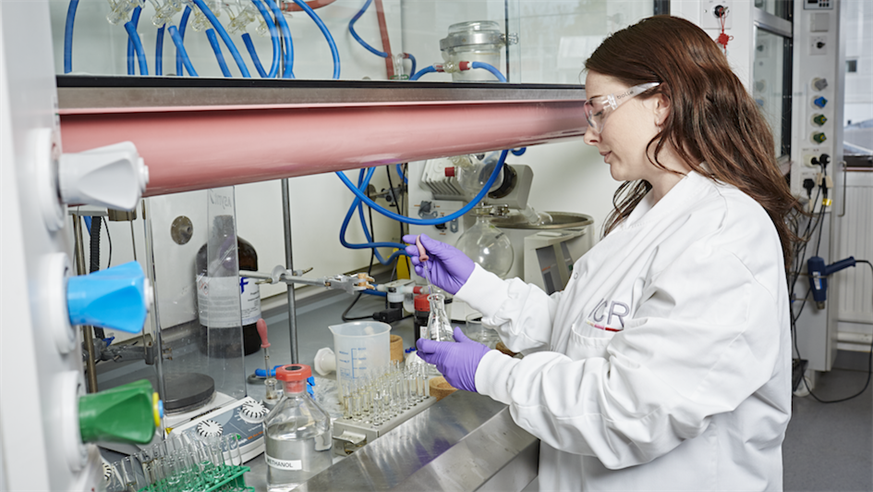
Image: Hands pipetting via Pixabay courtesy of mwooten. License: CC0
Research students are an intrinsic part of any vibrant academic research culture – and The Institute of Cancer Research, London is no exception. We have talented postgraduate students working towards degrees in all areas of our research – and they are an integral part of our community. This week, as we celebrate the achievements of our graduating students at the ICR’s annual award ceremony, we are also already planning the recruitment of new PhD students who will start in October 2020.
We recently announced our public campaign to raise the final £15 million to help us finish one of the most exciting projects we have carried out at the ICR in recent years – the creation of our Centre for Cancer Drug Discovery. This pioneering new facility is a vital part of our research strategy and embodies our ongoing commitment to investing in world-class infrastructure. But we are acutely aware that creating great new facilities like this won’t defeat cancer – they need to be filled with talented, creative researchers with big ideas. Many of those will be PhD students.
Opportunities to work at the cutting edge of drug discovery
Some of our successful PhD candidates will have the opportunity to work in the new Centre for Cancer Drug Discovery, working alongside world leaders in drug discovery and evolutionary science in a new area of research right at the cutting edge of cancer therapeutics. They will be working on projects aiming to study cancer through the prism of our new understanding of cancer evolution – and to pioneer innovative approaches to treatment intended to anticipate and overcome evolution and drug resistance.
We are hugely excited at the prospect of this new global centre of expertise in anti-evolution therapies, which aims to deliver step-change advances in treatment which can turn cancer into a disease that can be controlled long term and eventually cured. We gained huge media attention for the launch of our appeal, as we released details of what we are describing as the world’s first ‘Darwinian’ drug discovery programme.
Our third 'ICR Teaching Week' begins on 1 July and all of our teaching week content — including news items, blog posts and videos — will be gathered together on one page:
Read more
We aim to create completely new ways of attacking cancer – including blocking the entire process of evolutionary diversity, using AI and advanced maths to herd cancer into more treatable forms, and tackling cancer with multi-drug combinations as used successfully in diseases such as HIV and tuberculosis. We are excited, for example, by the potential of APOBEC inhibitors to slow down evolutionary diversity and drug resistance and ensure existing cancer drugs work for patients for much longer.
Fiona Want is one of our current second-year PhD students in our Division of Cancer Therapeutics. She is working to understand APOBEC proteins and is excited about her imminent move into the new Centre for Cancer Drug Discovery. “In the new centre, I will be able to collaborate even more readily with experts in evolutionary biology, which will facilitate the cutting-edge experiments needed to delve deeper into ABOBEC’s role,” she says. “I can see the new site from my office window, and it’s been exciting to watch the new building grow every day. I’m now getting ready to move – sorting through the labs and deciding what we want to take with us!”
Training the next generation of cancer researchers
But the Cancer for Cancer Drug Discovery is far from the only game in town at the ICR as we put our ambitious research strategy into action. There are many other exciting areas of research we are taking forward, including convergence science – which involves bringing together biologists with engineers and physicists to create innovative medical technologies. Our new convergence science centre, a partnership with Imperial College London and the funder Cancer Research UK, aims to break down the barriers between different areas of research to improve the lives of people with cancer – by developing new technologies for cancer diagnosis, monitoring and treatment.
One of our strategic goals is to train the next generation of convergence scientists by building cross-institutional research teams with supervisors from distinct disciplines who will equip our PhD students with cutting-edge research skills. The centre is currently open to submissions for convergence PhD project proposals from researchers based at both organisations. We will be selecting high-quality, original ideas that address a challenge in cancer and provide students with training across multiple disciplines.
The ICR and Imperial were also successful in securing joint Cancer Research UK funding for clinical academic training. This will enable us to expand opportunities to train doctors to be clinical academic leaders in cancer research. Through this collaboration, we are offering clinical research training fellowships for clinicians in their specialist training, and for the first time in 2020, the ICR and Imperial will be offering a unique opportunity for the most talented medical students to take part in an intercalated cancer research PhD, during their undergraduate medical course.
Our highly competitive and prestigious PhD studentships enable science graduates to carry out cutting-edge cancer research alongside world leading scientists.
Find out more
The future looks bright
These are exciting times for the ICR. As part of our ambitious plans to defeat cancer, we continue to improve our infrastructure while also playing a leading role in preparing tomorrow’s leaders of the global cancer research community.
We hope our approach will ensure that the brightest minds are equipped and ready to tackle the biggest challenges in cancer evolution and convergence science, both now and in the future.
comments powered by